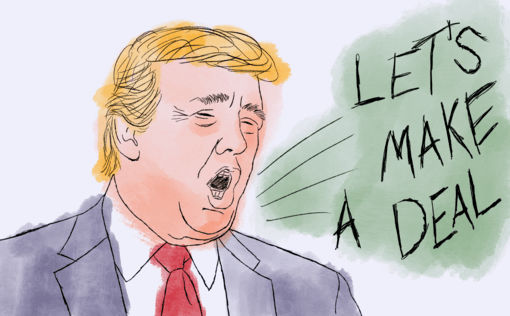
Drawing by Nathaniel St. Clair
On Friday 13 March, listening to the President’s speech on the state of emergency provoked by the Coronavirus, I was thinking that the litany of interdictions enumerated had all the features of a crisis heterotopia. I reveled at all the “measures” he recalled: banning assemblies of people, canceling performances and sporting events, in short “social distancing” (better qualified as “physical distancing”) and cutting off an entire continent, with the (temporary) exception of one chosen Anglo-Saxon one from which you can still return to the USA, unless you are an alien trying to sneak into the American dreamland through Great Britain, after having sojourned in a suspicious European country. And if someone dares such a deviousness, they will be repelled.
I thought that this time reality was indeed stranger than science fiction. A deadly virus attacking humanity, and having originated from a vicious, bat or snake from a distant land, or having escaped a laboratory, or even having descended upon us from a-high from a different planet.
Of all the talk of American resilience put in military parlance, “we will prevail” and “we will defeat this threat,” I was struck by an absence, one that makes the speech a simulacrum of sorts: No mention of the lagging behind in testing. Apparently the test kits recommended by the WHO have not been approved, perhaps for political reasons, lest the results harm the elections…..?? or is it more financially advantageous to have concocted tests that proved ineffective after all? Trump and his team during the conference press promised test kits “in the near future,” but everyone remained evasive as to exactly when this near future would occur, though the CEO of Lab Corps and Quest Diagnostics confirmed that national labs throughout the nation will “very soon” deliver.
Why, as of March 9, 2020, the US tested 8,554 individuals to a rate of 26 tests per a million people; on the other hand South Korea did much better, testing 8, 354 individuals to a rate of 4,910 per million people, and France 11,895 individuals to a rate of 182 tests per million people. Why these disparate figures when, in the words of President Trump during the state of emergency speech, “no nation is more prepared or more equipped to face down this crisis” because “we are rated number one in the world and we are helping other nations, a lot.” Really? So why are we at the bottom of the list of 18 countries, after Turkey and Vietnam, testing for the Coronavirus? Could it be that a long tradition of poor healthcare shows its tentacles precisely in moments of acute crisis?
When someone from the audience asked if that delay in testing was indeed a failure, Trump evaded the question and passed the mike to one of his associates who beat around the bush and said something to the effect that nobody knew the turn the virus would take. But isn’t that the definition of lack of preparedness? Nevertheless, Trump flaunted the great “accomplishment” of having closed the borders: “we acted quickly and we acted early,” lavishing praise on his team—he called them geniuses—and especially the leader of the “coronavirus task force,” Mike Pence.
In an amazing feat of self-contradiction, when two members of the audience asked him about the timeline for those test kits to become available for every American, Trump replied that people without symptoms should not be tested and “we don’t want people to take a test when they shouldn’t be.” Really? So why all the hullabaloo about self-isolation for two weeks if you are coming back from Europe or if you have been exposed to the virus?
Several members of the audience brought it home and asked him the same question with various degrees of urgency: Since those returning American travelers were required to self-quarantine and to undergo “further screening,” having been exposed to the virus in Europe, was he himself not going to be tested or self-isolate? After all, he had visited with the President of Brazil a few days earlier in Mar-a-Lago and it was proven that one of the members of Bolsonaro’s delegation—Jair Wajngarten—had tested positive for the Coronavirus. Trump was even photographed next to him. To this, Trump replied that Bolsonara was doing a great job in Brazil, and that he was a very nice person who had tested negative after all. He added that he himself had no symptoms and that he did not need to be tested, according to the White House physicians. To further drive his point home, Trump pointed out that after all he did not know the person standing beside him on the photograph, as if that lack of acquaintance was a sure shield against the virus! Frustrated by all this run-around, another reporter asked him verbatim if he was “being selfish to expose” others to his virus. Trump interrupted her, pointing his index finger to the next reporter who, unluckily for Trump, happened to have the very same concern! In an about-face, Trump conceded that he will be tested “but not because of that.” Not because of what? I was left wondering. Did he want to be tested only for the fun of it?
Since this speech, Trump indeed tested for Coronavirus and allegedly, the result came back negative. But one is left pondering about the fabric of contradictions and the evasiveness that punctuated his speech, the situation with the test kits or lack thereof, the initial refusal to test, his flouting the recommendations of the CDC that he himself had endorsed and litanized, and overall, the tentacles underneath the politics of the handling of the Coronavirus crisis in the US.